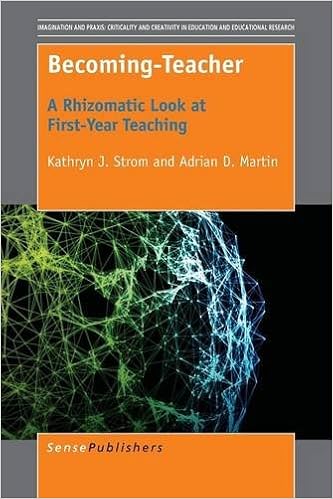
By Myint Swe Khine, Shaljan Areepattamannil
In the sphere of schooling, researchers firmly think that non-cognitive abilities and components are both or maybe extra very important than cognitive elements within the educative procedure and for employment potentials. while deciding upon the non-public features which are required to operate good within the twenty first century, the function of non-cognitive components is frequently highlighted within the discourse. lately, expanding makes an attempt were made to enquire the position of non-cognitive components in educational luck. The suggestion of 'non-cognitive' has many phraseological collocations. between often used collocations are constructs, characteristics, talents, talents, variables, results, attributes, and predictors. moreover, a myriad of different particular abilities were pointed out as non-cognitive. to call a couple of: grit, tenacity, interest, attitudes, self-concept, self-efficacy, anxiousness, coping suggestions, motivation, perseverance, self assurance are between these often said within the literature. In a few situations, non-cognitive elements are thought of multifaceted. a few refer them to smooth abilities and private features that fall below the purview of affective domain.
This e-book makes an attempt to outline non-cognitive qualities, how one can degree them, impression of non-cognitive elements and the way they could impact the confident results in educational fulfillment, impression in employability, and good fortune in social existence. the knowledge contained during this ebook presents wisdom development and present considering non-cognitive components and academic concepts that may be successfully used to nurture the health of individuals.
Read Online or Download Non-cognitive Skills and Factors in Educational Attainment PDF
Best schools & teaching books
The planned Dumbing Down of the US - A Chronological Paper path through Charlotte Thomson Iserbyt 1999 Paperback
Get Religion in the schools: a reference handbook PDF
Faith within the faculties examines the numerous elements of this advanced topic, together with prayer within the colleges, the instructing of evolution, and different concerns that proceed to generate controversy. It offers a large evaluate of the topic, in addition to a close exam of the underpinnings of the felony and societal wall among church and country.
Download e-book for kindle: Children and Childhoods 1: Perspectives, Places and by Peter Whiteman
The early years of lifestyles are speedy gaining prominence worldwide. it's good documented that funding in early early life ends up in awfully excessive returns in a number of arenas; more than these caused by company excited about later classes in humans s lives. This e-book offers present early years study that displays the transdisciplinary nature of youth.
Dominant conceptions within the box of schooling place instructor improvement and instructing as linear, reason and impression transactions accomplished by way of lecturers as remoted, self sufficient actors. Yet rhizomatics, an emergent non-linear philosophy created through Gilles Deleuze and Felix Guattari, deals a point of view that counters those assumptions that lessen the complexity of lecture room job and phenomena.
- The Reading Crisis: Why Poor Children Fall Behind
- Sense and Sensitivity: The Identity of the Scholar-Writer in Academia
- Inside Teacher Education: Challenging Prior Views of Teaching and Learning
- U.S. Marine Corps Rifle, 5.56MM, M16A2 Technical Manual
- The Brothers and Sisters Learn to Write: Popular Literacies in Childhood and School Cultures
Extra info for Non-cognitive Skills and Factors in Educational Attainment
Example text
What are non-cognitive skills? 8 Indeed, to illustrate the unique difficulty of defining these skills, we note the ongoing debate about how researchers and writers should refer to these skills (the current list includes such terms as behavioral skills, soft skills, personality traits, interpersonal and intrapersonal skills, non-cognitive abilities, character, socio-emotional skills, and non-cognitive skills), as well as the sometimes controversial delimitations between cognitive and non-cognitive skills, or between personal traits and learnable non-cognitive skills.
One useful resource is a new guide explaining how states can develop such practices and how policymakers can work to enact and implement them (Restorative Practices Working Group, 2014). 45 E. GARCÍA Finally, there are encouraging examples at both the state and district levels of a shift away from harsh and punitive disciplinary practices and toward these types of supportive measures. California recently became the first state to ban suspensions for “willful defiance” (Siders, 2014). And a number of large school districts—including Baltimore, Boston, New York City, Minneapolis, and Oakland—have adopted restorative policies that steer students toward positive and reinforcing means of addressing problem behaviors (Restorative Practices Working Group, 2014, 10–11).
This first section includes a definition of non-cognitive skills and explores the evidence-based findings on their role in education and adulthood outcomes, and on how they are nurtured. We then extend this discussion by providing a tentative list of skills that are both important for and can be nurtured by schools. The second section examines how education policy could help schools better nurture non-cognitive skills. Contrasting what we know about non-cognitive skills with how policy currently treats them, we contend that non-cognitive skills deserve more attention in the education policy arena.



